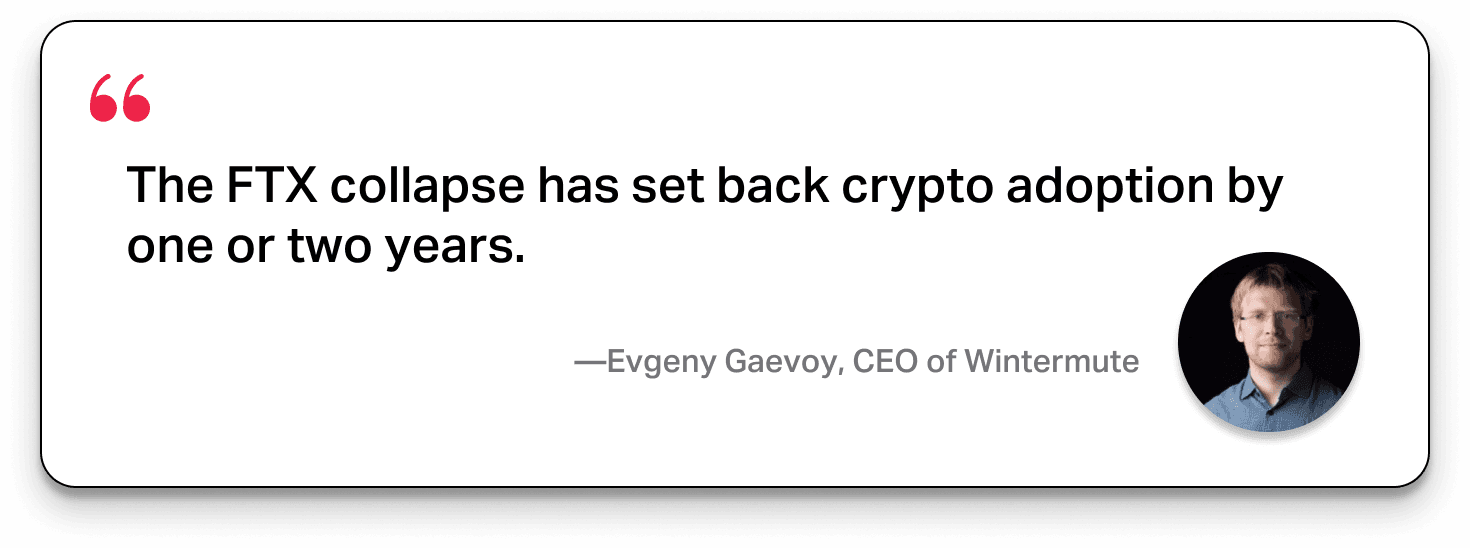Fall From Grace: What is FTX?
Sam Bankman-Fried was the lord of his crypto kingdom, but it all came crashing down. Will crypto survive the devastating domino effect?

The crypto space is still in its infancy, and the bear market has squeezed the market cap from $3 trillion to $930 billion. Although this low market cap makes the asset class a land of opportunity, this comes with a lot of potential risks.
The former hedge fund manager at Goldman Sachs and CEO of Real Vision, Raoul Pal, predicts that the crypto market might increase to $250 trillion by the end of 2030. However, history suggests that this growth would be far from steady, and this was sorely proven by the crypto exchange FTX.
What is FTX?
The FTX exchange was a crypto trading and derivatives platform founded by MIT graduate Sam Bankman-Fried, better known as “SBF,” in 2018. Before it fell apart, FTX offered crypto trading products like margin trading and options.
The FTX exchange was a centralized platform for people to store and trade cryptocurrencies. It grew to be the third-largest centralized exchange for derivatives and one of the biggest crypto marketplaces in terms of trade volume.

How cryptocurrency exchanges work
Crypto exchanges are like stock exchanges for digital assets. They act as intermediaries between the buyers and sellers. Though blockchain and digital currencies were made to be decentralized, centralized exchanges offer a liquidity solution and a user experience that adds a layer of comfort, reliability, and ease.
However, centralization also comes with risks.
Exchanges make it easy to use crypto without setting up a crypto wallet since they serve as a custodial service—like a bank, but without all the regulations and consumer protections. This makes them responsible for holding customer funds in their own digital vaults, which makes them a middleman with a lot of power over people’s finances. And with great power, comes great responsibility.
The FTX downfall has caused a domino effect that severely wounded other exchanges like Gemini, and killed entire companies like BlockFi.
These exchanges have been subjected to hacking and fraud, which has led to users losing their funds. This is the single biggest crypto exchange collapse since the Japanese exchange Mt. Gox, which remains the biggest exchange downfall in crypto history.
Mt. Gox lost hundreds of thousands of Bitcoins in a hacking incident, causing the exchange to file for bankruptcy and for users to never see their funds again. The FTX case is almost identical in impact and scale, if not worse.

Mark Karpeles, CEO of Mt. Gox, at the start of a news conference at the Tokyo District Court in Japan, in 2014.
Source: Reuters
How FTX Trading ltd. collapsed
Murphy’s law that anything that can go wrong will go wrong holds true for the unregulated crypto space. FTX was a thriving crypto exchange, their logo stamped on a Mercedes F1 car, lauded as an ICC Cricket Worldcup sponsor, and even the namesake of the FTX arena in Miami. But as the year came to an end, so did FTX.
The inevitable downfall began on November 2, when a Coindesk article shed light on how Alameda Research, a trading company also owned by Bankman-Fried, had heavy exposure to the FTT token (the native token of FTX) on their balance sheet. Alameda Research had almost $5 billion in FTT, which raised questions about the firm’s solvency.
Rumors of insolvency pushed Binance, the only crypto exchange larger than FTX, to take risk management measures by selling their FTT holdings. This became the catalyst for the mass selling and investor confidence plummeting alongside the price of the FTX native token FTT.
A liquidity crisis ensued, pushing the price of the token FTT down 80%. FTX CEO Sam Bankman-Fried was urged to approach the CEO of Binance, who then announced his company’s intent to acquire FTX.com, the non-U.S. business of FTX.
However, Binance took a U-turn on its rescue offer when it found out that FTX was mishandling customer funds. Surprisingly enough, Alameda Research was caught using user funds from FTX. Bankman-Fried admitted that the exchange had insufficient funds to meet customer demands, for which he apologized in an elaborate Twitter thread.

FTX CEO Sam Bankman-Fried escorted out of the Magistrate Court building after his arrest in Nassau, Bahamas, December 13, 2022
Source: Reuters
This is when everything came tumbling down. FTX filed for bankruptcy, and Bankman-Fried resigned. The exchange also experienced a hacking attempt that stripped it of $477 million in company funds.
The FTX fiasco concluded with a class-action lawsuit filed against Bankman-Fried, after which he was arrested in the Bahamas (where FTX was based) on multiple charges of fraud.
Impact of crypto exchange FTX collapse
The FTX fiasco caused shockwaves across the cryptosphere. The price of bitcoin saw multiple plunges during the FTX demise. West Realm Shires Services Inc., Alameda Research, and 130 other affiliated companies filed for chapter 11 bankruptcy. And the event affected a lot of FTX investors.
Another interesting result was the legal scrutiny celebrities have faced for endorsing FTX. Steph Curry, Tom Brady, Larry David, Shaquille O’Neal, and Kevin O’Leary are all among the high-profile names being sued for targeting “unsophisticated investors” to use the fraudulent exchange.
Edwin Garrison, a resident from Oklahoma who purchased a yield-bearing account from FTX, filed the complaint on November 15, 2022, in the Florida federal district court:
Part of the scheme employed by the FTX Entities involved utilizing some of the biggest names in sports and entertainment—like these Defendants—to raise funds and drive American consumers to invest
Even with celebrity endorsements, the public image of Bankman-Fried and FTX couldn’t ensure the security of the platform. This signals that the crypto space still has a long way to go, and the bitter FTX drama will reshape how the industry operates.
- Regulation—Investors will demand protection for crypto funds they hold on exchanges. Lawsuits will attract regulatory scrutiny as financial authorities push for more accountability of crypto platforms. This means tighter licensing regimes for new exchanges and web3 startups.
- Innovation—Startups will develop innovative solutions for security and decentralization to cater to investors’ new needs and to comply with tougher regulations.
- Consolidation—The crypto winter could mean the demise of numerous coins, companies, and investors. Certain crypto projects, like the Solana ecosystem, will struggle to survive.

Crypto companies have struggled to stay afloat in the bear market. Even companies like Coinbase have downsized their workforce in preparation of a market freefall. The FTX downfall has caused a domino effect that severely wounded other exchanges like Gemini, and killed entire companies like BlockFi.
The crypto market saw a similar collapse in early 2022 when Terra Luna took a nose dive. The same year, the Three Arrows Capital crypto hedge fund and the crypto lending company Celcius both crashed and burned.
Being one of the biggest exchanges in the market, FTX’s suspended withdrawals affected a lot of major traders and businesses in the industry.
- Genesis, a trading firm, tweeted that its derivatives business had $175 million in their FTX trading account. However, these locked funds did not affect their ability to function and serve customers.
- The market maker Wintermute admitted that their funds were locked on FTX. However, they also tweeted that the amount “is within our risk tolerances and does not have a significant impact on our overall financial position.”
- Amber Group’s trading firm admitted to being an active trading participant on FTX but, similar to other firms, explained in an elaborate twitter thread that the firm’s strict policies on individual trading venues meant that their FTX funds represented less than 10% of their trading capital.
- Other trading and investment giants like Pantera Capital, Coinshares, Multicoin Capital, and Liquid Meta admitted to having limited exposure on FTX, due to which their businesses weren’t under any kind of threat.
The crypto market has hit rock bottom for months and there has been little positive momentum since the setbacks. Given market conditions and expert opinions, the current value of bitcoin could prove to be a great entry point if coupled with a dollar-cost average strategy.
Sam Bankman’s Resurgence
Bankman-Fried took to his Substack blog in an attempt to gain public empathy, where he explained the FTX bankruptcy from an objective point of view. The defendant stated that the U.S. division of FTX was fully solvent and had over $350 million in surplus cash exceeding customer balances when he handed the firm over to his bankruptcy team.
The downtrend has wiped out $42 billion in investor value and jeopardized dozens of web3 businesses.
Bankman-Fried also wrote that he proposed to contribute all of his personal Robinhood shares to pay back FTX customers. However, the blog post stirred up another conspiracy as some claims by the ex-CEO were substantially different from Bankman-Fried’s legal stance.
His court filings expressed opposition to the idea of dissolving his shares to pay FTX creditors. He stated that his shares were bought legitimately and that it’s “improper for the FTX debtors to ask the court to simply assume that everything Bankman-Fried ever touched is presumptively fraudulent.”
Caught in one of the biggest crypto controversies to date, Bankman-Fried has drawn eyeballs from both within and outside the crypto space, as well as attention from regulatory bodies around the world. Bankman-Fried’s fate hinges on how this all plays out, including the testimony of FTX’s ex-CEO.
How investors can stay secure in the crypto market
The best way to steer clear of hacks, frauds, and other illicit activities is having custody of your own assets. Using a hardware wallet or installing self-custodial wallet software are the two best ways to take the reigns on your crypto portfolio. These ensure that you own your private wallet keys instead of a third-party holding them for you.
You can also use crypto exchanges like Kraken that provide proof of reserves (PoR), which uses blockchain evidence to prove that an exchange actually holds the funds deposited by users. Investors should look for exchanges that offer PoR or are publicly audited to avoid the next FTX.
Crypto traders must ultimately decide which centralized and decentralized platforms to use based on preferences around risk and convenience. Centralized exchanges offer the best onramp experience and are the easiest way to turn fiat into stablecoins or hundreds of other digital assets that meet their listing standards.
Exchanges like Coinbase and Public have a good record on ensuring security. On the other hand, decentralized exchanges (DEX) are also a great way to swap cryptos you store on a self-custodial wallet.
Since DEXs use smart contracts, they don’t require humans to execute trades and offer a truly decentralized trading experience that’s both private and secure.

Don’t put all your eggs in one basket—this is subject to interpretation when it comes to crypto investments. The best strategy is to spread your allocations across several coins, wallets, and centralized platforms.
Despite a months-long crypto bear market, web3 is still one of the most lucrative industries to invest in. But it isn’t necessarily the safest. The downtrend has wiped out $42 billion in investor value and jeopardized dozens of web3 businesses.
So, while your crypto portfolio can yield returns, it’s part of a diversified portfolio that’s exposed to other industries and assets. Luxury watches, real estate, baseball cards, and NFTs have proven to be excellent investments in value and returns.
Extreme volatility, suppressed trading volumes, and plunging crypto and NFT prices shouldn’t be what dissuade investors. Depending on how you read the fear and greed index, the shockwaves of the FTX debacle could be seen as an opportunity.
